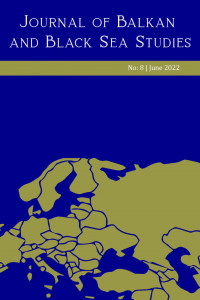EU Conditionality on Normalisation Deal of Serbia and Kosovo: Standards Before Status Approach Still Valid?
Abstract
‘Standards before status’ approach referred to eight main conditionality for Kosovo. 2004 events has shaken the confidence in Kosovo’s ability to transform itself to a multi-ethnic and tolerant society and called for the need in addressing Kosovo’s status. Although Kosovo’s ‘European future’ was adopted in 2005, its contested status has been the most troublesome issue. This paper argues that complying with standards is still key to the EU condilitionality policy implied. Nonetheless, the political developments proves that mutually-agreed solution to the status issue could be referred as the main incentive of Serbia’s and Kosovo’s commitment to the Dialogue.
Keywords
Serbia EU Conditionality Normalization Status. Serbia, EU, Conditionality, Normalization, Status.
References
- Bergmann, Julian (2018) “Same Table, Different Menus? A Comparison of UN and EU Mediation Practice in the Kosovo-Serbia Conflict”, International Negotiation, 23 (2), pp. 238-257.
- Bieber, Florian (2014) “The Serbia-Kosovo Agreements: An EU Success Story?”, Review of Central and East European Law, 40 (3/4), pp. 285-319.
- Borgh, Chris van der, Frerks, Georg & Dirkx, Toon (2016) “Findings on EU peacebuilding capabilities in Kosovo, Afghanistan, Honduras, Guatemala, and Sri Lanka - A Desk Review”.
- Economides, Spyros & Lindsay, James Ker (2015) “Pre-Accession Europeanization: The Case of Serbia and Kosovo”, Journal of Common Market Studies, 53 (5), pp. 1027-1044.
- Elsuwege, Peter Van (2017) “Legal Creativity in EU External Relations: The Stabilization and Association Agreement Between the EU and Kosovo”, European Foreign Affairs Review, 22 (3), pp. 393-410.
- Galluci, Gerard M. (2011) “The Ahtisaari Plan and North Kosovo”, Trans Conflict, November.
- Greiççevci, Labinot (2011) “EU Actorness in International Affairs: The Case of EULEX Mission in Kosovo”, Perspectives on European Politics and Society, 12 (3), pp. 283-303.
- Kartsonaki, Argyro (2020) “Playing with Fire: An Assessment of the EU’s Approach of Constructive Ambiguity on Kosovo’s Blended Conflict”, Journal of Balkan and Near Eastern Studies, 22 (1), pp. 1-18.
- Maksimovic, Sandra (2020) “What did Serbia and Kosovo sign in Washington?”, European Western Balkans.
- Orosz, Anna (2016) “Implementation of the Belgrade-Prishtina Dialogue: Results, Controversies and Prospects”, the Director General of the Institute for Foreign Affairs and Trade. Peci, Lulzim, Dugolli, Ilir & Malazogu, Leon (2006) “Negotiating Kosovo’s Final Status”, Conference Paper, March.
- Ushkovska, Mare (2020) “The EU’s Rivalry With the U.S. Is Complicating Serbia-Kosovo Talks”, World Politics Review.
- Visoka, Gezim & Doyle, John (2016) “Neo-Functional Peace: The European Union Way of Resolving Conflicts”, Journal of Common Market Studies, 54 (4), pp. 862-877.
- Weller, Mark (2008) “Negotiating the Final Status of Kosovo”, Institute for Security Studies, Chaillot Paper.
EU Conditionality on Normalisation Deal of Serbia and Kosovo: Standards Before Status Approach Still Valid?
Abstract
‘Standards before status’ approach referred to eight main conditionality for Kosovo. 2004 events has shaken the confidence in Kosovo’s ability to transform itself to a multi-ethnic and tolerant society and called for the need in addressing Kosovo’s status. Although Kosovo’s ‘European future’ was adopted in 2005, its contested status has been the most troublesome issue. This paper argues that complying with standards is still key to the EU condilitionality policy implied. Nonetheless, the political developments proves that mutually-agreed solution to the status issue could be referred as the main incentive of Serbia’s and Kosovo’s commitment to the Dialogue.
Keywords
References
- Bergmann, Julian (2018) “Same Table, Different Menus? A Comparison of UN and EU Mediation Practice in the Kosovo-Serbia Conflict”, International Negotiation, 23 (2), pp. 238-257.
- Bieber, Florian (2014) “The Serbia-Kosovo Agreements: An EU Success Story?”, Review of Central and East European Law, 40 (3/4), pp. 285-319.
- Borgh, Chris van der, Frerks, Georg & Dirkx, Toon (2016) “Findings on EU peacebuilding capabilities in Kosovo, Afghanistan, Honduras, Guatemala, and Sri Lanka - A Desk Review”.
- Economides, Spyros & Lindsay, James Ker (2015) “Pre-Accession Europeanization: The Case of Serbia and Kosovo”, Journal of Common Market Studies, 53 (5), pp. 1027-1044.
- Elsuwege, Peter Van (2017) “Legal Creativity in EU External Relations: The Stabilization and Association Agreement Between the EU and Kosovo”, European Foreign Affairs Review, 22 (3), pp. 393-410.
- Galluci, Gerard M. (2011) “The Ahtisaari Plan and North Kosovo”, Trans Conflict, November.
- Greiççevci, Labinot (2011) “EU Actorness in International Affairs: The Case of EULEX Mission in Kosovo”, Perspectives on European Politics and Society, 12 (3), pp. 283-303.
- Kartsonaki, Argyro (2020) “Playing with Fire: An Assessment of the EU’s Approach of Constructive Ambiguity on Kosovo’s Blended Conflict”, Journal of Balkan and Near Eastern Studies, 22 (1), pp. 1-18.
- Maksimovic, Sandra (2020) “What did Serbia and Kosovo sign in Washington?”, European Western Balkans.
- Orosz, Anna (2016) “Implementation of the Belgrade-Prishtina Dialogue: Results, Controversies and Prospects”, the Director General of the Institute for Foreign Affairs and Trade. Peci, Lulzim, Dugolli, Ilir & Malazogu, Leon (2006) “Negotiating Kosovo’s Final Status”, Conference Paper, March.
- Ushkovska, Mare (2020) “The EU’s Rivalry With the U.S. Is Complicating Serbia-Kosovo Talks”, World Politics Review.
- Visoka, Gezim & Doyle, John (2016) “Neo-Functional Peace: The European Union Way of Resolving Conflicts”, Journal of Common Market Studies, 54 (4), pp. 862-877.
- Weller, Mark (2008) “Negotiating the Final Status of Kosovo”, Institute for Security Studies, Chaillot Paper.
Details
| Primary Language | Turkish |
|---|---|
| Journal Section | Articles |
| Authors | |
| Publication Date | June 29, 2022 |
| Published in Issue | Year 2022 Issue: 8 |


